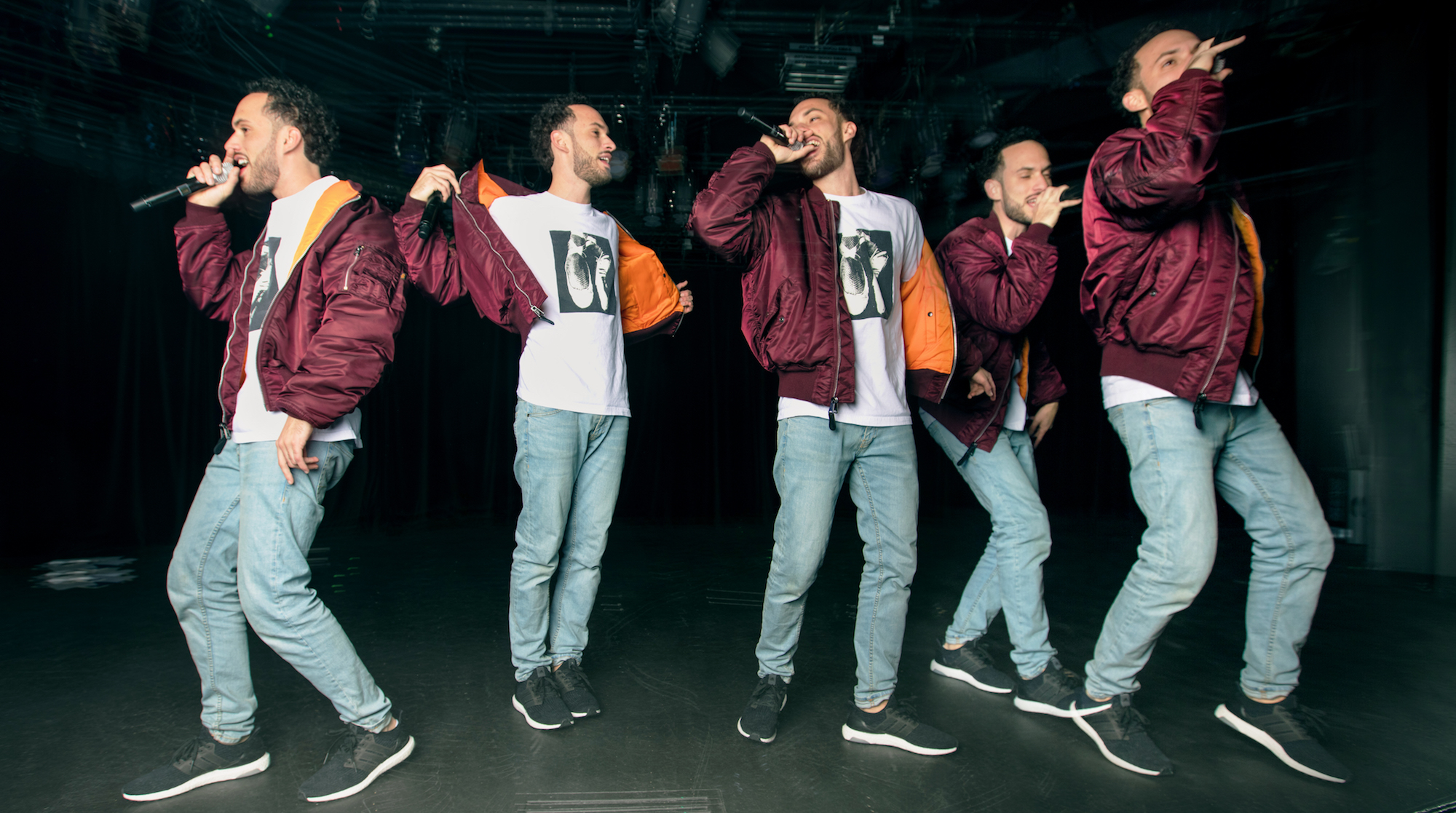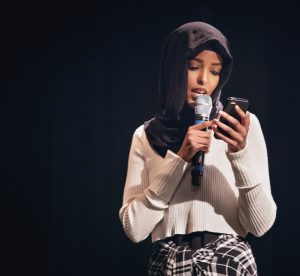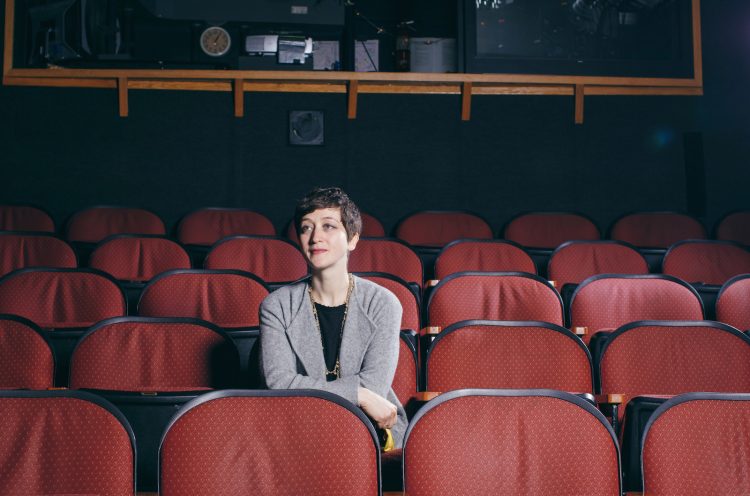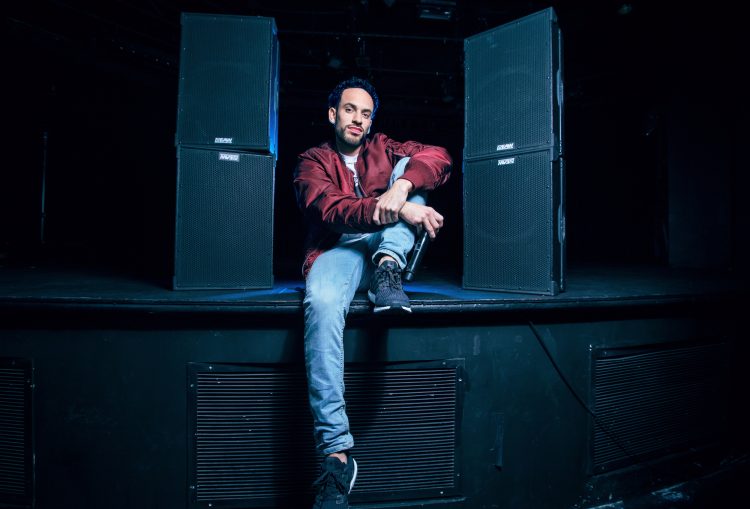

Every seat in the Ethnic Cultural Theater is taken, and so are most of the steps. Latecomers can only peek in from the lobby—and they will, for the next two hours. It’s open mic night hosted by RETRO Revolutionary Poets, a student group on the University of Washington Seattle campus, and nearly 200 people have come to watch their peers perform.
The crowd sways to the beat of the DJ’s music, and a pair of emcees trade gibes to start the show. The first act is Naimo Yusuf, a UW Bothell freshman wearing a hijab. “I learned recently about the law of malice,” Yusuf says, describing a state law that shields police officers from prosecution for the use of deadly force.

Naimo Yusuf
People grow restless during Yusuf’s introduction, and she notices. “Sorry, I talk too much,” she says. A male voice calls out from the darkened hall: “Nah, you’re fine.” When it sinks in that “You’re fine” is also a pickup line, the theater erupts in laughter. Yusuf drops her head, embarrassed for a moment. Then, without warning, she dives into her poem.
“When you commit a crime, and harm us and scar us, we have to prove it was your intent?” she says. Fingers snap in support. “Tell me, how is that possible? When your body’s doing damage, and your mouth is spreading madness, and you’re telling all these lies? But the color of your skin is blinding, so they turn the other eye.”
When Yusuf finishes, the theater erupts again—this time in applause, and agreement.
RETRO has hosted monthly open mic nights since 2002, when students Anthony Rose, ’09, and Tony Rivisto, ’06, started the club as a place for students of color to mix creativity with activism. The name is both an abbreviation (retrospective) and an acronym (respect, educate, teach, reflect, observe).
The open mics have offered a haven for young poets over the past 15 years, especially those who perform spoken word, slam poetry and hip-hop music. Some take the stage for fun, while others have garnered national attention for their performances.
This new generation of UW poets descends from a prestigious history. In the 20th century, the prolific professors of the English department—Theodore Roethke (Pulitzer Prize for Poetry, 1954), David Wagoner (Pushcart Prize, 1977), and renowned teaching couple Nelson and Beth Bentley—crafted verses that helped shape the Northwest voice. They inspired students like Richard Hugo, ’48, ’52, and Linda Bierds, ’69, ’71, who then blazed their own trails as lauded wordsmiths.
The legacy of that era looms large. Bierds, whose work appears regularly in The New Yorker, now teaches poetry workshops in the English department, and other faculty and alumni remain at the forefront of the Northwest poetry scene.
But many of UW’s modern poets hail from programs outside of English. They use poetry to investigate what they learn in departments like Ethnic Studies and Comparative History of Ideas, and to dissect and defend their identities along the way.
Seattle poet Troy Osaki, a 2013 Ethnic Studies grad, performs spoken word at competitions across the United States. In a piece called “Year of the Dragon,” Osaki assumes the persona of actor and martial artist Bruce Lee (another former UW student), who confronted discrimination early in his Hollywood career:
“I heard all their excuses.
But I knew the reason
why they sidestepped my fight scenes
was to avoid staining their screens
with slanted eyes.
I had to finger jab their vision
for America to see me correctly.”
Nikkita Oliver, ’15, a teacher and performer of spoken word, graduated from the UW School of Law. On Martin Luther King Day, Oliver stood at a podium on the back of a flatbed truck in downtown Seattle, speaking to thousands of marchers.
“We must hold tightly to a strong, rebellious, resilient, revolutionary love that refuses to accept hate,” Oliver told the crowd, packaging politics into poetry. “Right now is the time when justice is just us, being just us.”
In “Black Lives Matter,” a video poem recorded in front of Suzzallo Library, Oliver speaks to white people who feel threatened by activism:
“When I say ‘Black Lives Matter,’ I am not trying to take anything from you. I’m simply trying to dig deep below the muck, and the mire, and the bodies, and the streets—to find the seed of hope that still persists, to remind myself that my life matters, too.”
From stages and screens to marches and rallies, these modern UW poets perform the words they write. At first glance, this approach to poetry could be traced to the 1980s, when the birth of slam poetry coincided with the rise of hip-hop. But it goes back much further.
“Poetry’s origin is in oral culture,” says Amaranth Borsuk, a poet and assistant professor at UW Bothell. “The relationship of poets to performance has changed over time, based on what is popular and what’s in vogue.”
Bards of the Homeric age recited their work in group settings. While public performance has always been part of modern poetry, reading one’s work aloud became more central to the craft as audio recording devices were invented in the 19th and 20th centuries. A company called Caedmon Records popularized the trend in the 1950s by selling records by seminal poets like Dylan Thomas, Sylvia Plath and Robert Frost.

Assistant Professor Amaranth Borsuk
Borsuk performs her work in public spaces, but she also employs technology to make her words perform themselves. Her 2012 book “Between Page and Screen” features digital poems that must be deciphered with a webcam. When the book is held up to a computer, the words appear on the screen.
For another project, an iPhone app called Abra: A Living Text, Borsuk and collaborators Kate Durbin and Ian Hatcher wrote a poem that readers can interact with. “If you add language into it, the app learns that language,” Borsuk says. “Over the course of your reading, those words can come back to you.”
With “Pomegranate Eater,” her most recent book of poems, Borsuk has returned to stages from California to Colorado to perform. The book’s title references Persephone, the Greek goddess kidnapped by Hades and taken to the underworld (in the myth, Hades feeds her pomegranate seeds to ensure she returns each winter). In a poem called “Perception,” Borsuk recounts the abduction from Persephone’s point of view:
“You can’t imagine—a curtain rose, and when he entered flowers burned. Really, the underworld’s a perfect place for girls like me who never tan. I’ve got myself a man who’s into melodrama, what I always dreamed. Of course, it took some getting used to. I’m all nerve and he’s burnt sugar, bellicose, a burl in silk I like to run my fingers over.”
Borsuk teaches in UW Bothell’s Creative Writing & Poetics program, which offers evening classes for aspiring wordsmiths. “I like that our program is structured to support working students,” she says. “You don’t have to drop everything in your life to be an artist. It’s part of your identity. It’s who you are.”
On a Friday afternoon in Capitol Hill, Sol Moravia-Rosenberg smiles down at his cell phone as he picks at a chicken salad. “My last couple tweets went viral and I’m trying to figure out why,” he muses.
The day before, the soft-spoken hip-hop artist, better known by his stage name Sol, had fired off a tweet about the founder of the Coachella Music Festival, Philip Anschutz, who has donated to anti-LGBT groups. “Been saying this,” Sol wrote in a tweet that had been shared nearly 600 times, “but 2017 is going to be the year where we see who the allies really are.”
Sol, ’11, has always mixed activism with his music and his public persona. In November, he packed the nearby music venue Neumos for a show that raised $15,000 to build schools in Haiti, and he’s ready to feed off the frenzied political climate of 2017. “I feel in touch with my purpose now more than ever,” he says.

Sol
That’s saying something: During his four years at UW, Sol recorded five album-length projects (one of them, “Yours Truly,” charted on Billboard and hit #1 on iTunes). At 28 years old, he’s released over 100 songs and headlined two tours.
As a student, Sol double majored in Ethnic Studies and Comparative History of Ideas, and he traveled around the world on a $20,000 Bonderman Fellowship to explore the role that music plays in people’s lives. His time at UW exposed him to new ideas, but his political awakening happened long before college.
“I was already politicized, for lack of a better word, just by growing up as a biracial kid in America,” says Sol, whose mother is a Haitian immigrant. As a teenager, he read “The Autobiography of Malcom X” and listened to hip hop legends like Tupac and Nas. Week after week, he filled up rhymebooks with poems. “I didn’t know how to rap to a beat,” he says. “It was mostly on paper.”
By middle school, he was hanging around a music studio three to four nights a week—watching rappers record and writing lyrics to their beats in his head. He eventually made a MySpace page for his music and released his first mixtape as a high schooler. When he enrolled at UW, he expected to have a career in music by the time he graduated.
As a lyricist, Sol follows a strong legacy of former UW students and alumni. They include Mark Arm (Green River, Mudhoney), Kim Thayil (Soundgarden), Dave Dederer (The Presidents of the United States) and Kathleen Wakefield (who co-wrote the hit song “Nathan Jones” by The Supremes).
Hip hop, a relatively nascent genre, has a shorter but still impressive history at UW. In 2002, George Quibuyen, ‘13, and Saba Mohajerjasbi, ‘03—aka MC Geologic and DJ Sabzi—formed the hip hop duo Blue Scholars, skipping class to record their debut album in a studio inside Odegaard Library. The duo became a defining a pillar of Seattle’s hip hop scene.
Before Blue Scholars, Quibuyen performed spoken word with Isang Mahal, a Filipino-American arts collective that hosted talent shows on campus. Another collective, Urban Scribes, held a weekly open mic night at Cafe Solstice on the Ave in the early 2000s.
“Some pieces were composed with music, others were a cappella, and others were call and response with the audience,” says Erwin Thomas, ’02, a co-founder of Urban Scribes. “We used language to express our ideas, to work through our ideas.”
At a RETRO open mic in 2006, English student Stasia Irons, ’08, sat in awe as she listened to the singing voice of Catherine Harris-White, a jazz student at Cornish College of the Arts. Two years later, the two teamed up to form THEESatisfaction, an R&B/hip-hop duo that signed to Sub Pop Records and toured the country.
Sol went to his first RETRO open mic as a freshman in 2007, and he spent the next four years testing out material and debuting new pieces at the monthly gatherings (his parents, both UW grads, met at the Ethnic Cultural Center, across the street from the theater).
With the release of “Dear Friends, Vol. 2” in 2010, Sol’s fan base burgeoned. One track in particular, a stoner anthem called “So Damn High,” racked up a million hits on YouTube and became his signature track for several years. Sol started traveling as an opener for other Seattle artists, and in 2013, he headlined his first tour.
His latest album, 2016’s “Headspace Traveler,” was born out of a struggle with depression. It’s more somber than his previous work. On the song “See the End,” he raps about art’s potential to make social change—and the tendency of artists to squander that potential.
“Turning dollars into change, we can save the globe.
But most times we don’t. We just smoke up, and fall back,
and stay safe at home. Tune out, go numb
while they pull out their guns.
Tears fill my lungs while the streets fill with blood.”
Despite the dark thoughts, a smile is never far from Sol’s lips. His last album parties as much as it politicks, and the joy he gets from his job is apparent when you see him perform (fans call him “Solzilla” for his extreme on-stage energy). He’ll be the first to tell you how lucky he is to be doing this full-time.
But if you look past the viral videos and the sold-out venues, Sol is still that teenager filling up rhymebooks. He’s still that seventh-grader standing in the corner of the music studio, stitching together verses in his head—that student working part-time to pay tuition, that amateur rapper with a handful of fans. He keeps picking up the pen for the same reason he picked it up in the first place: “It’s just how I get through life. For as long as I feel, I’m gonna write.”